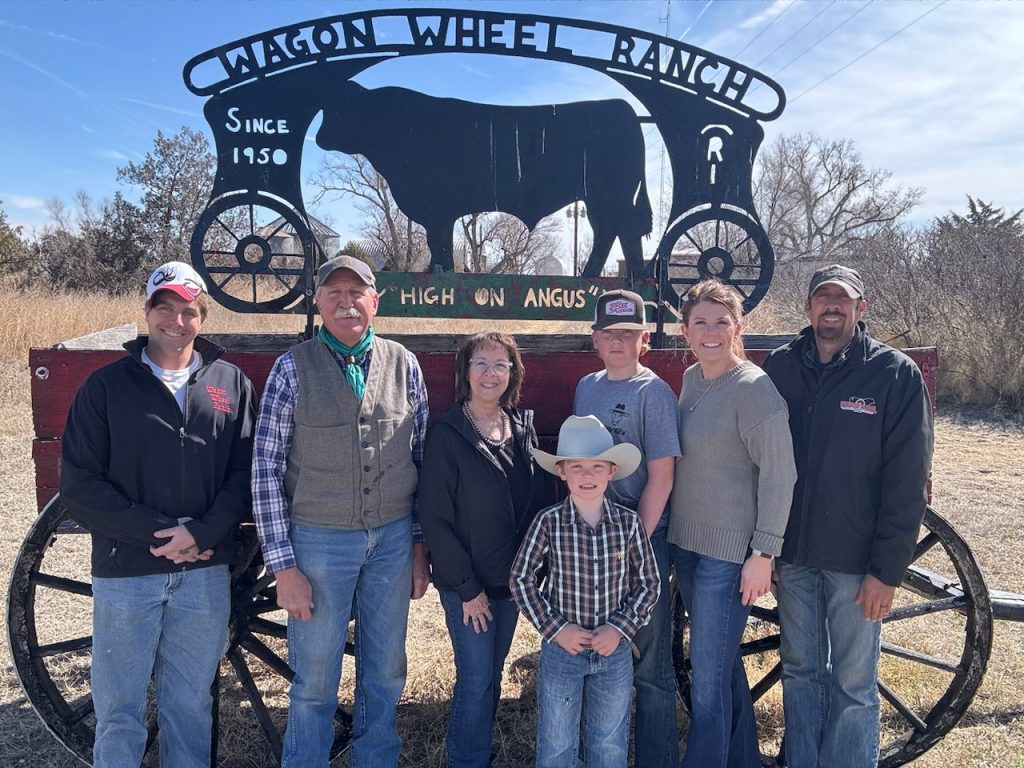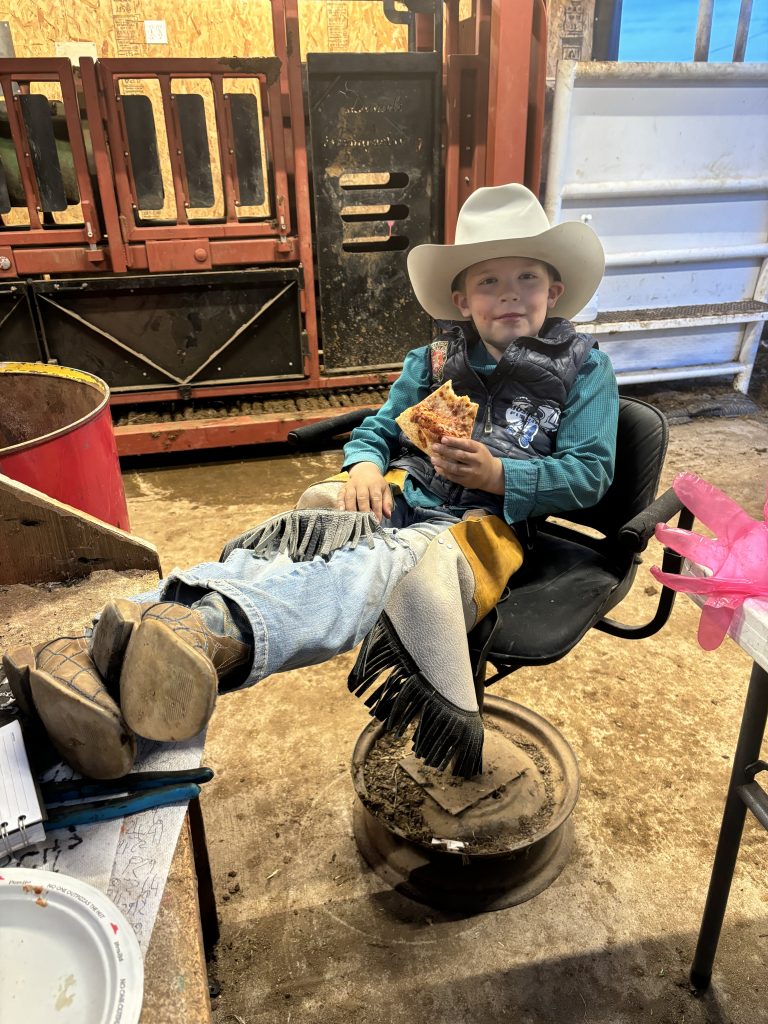Breeder’s Connection 2025 | Wagon Wheel Ranch
On the high plains of eastern Colorado sits a ranch that’s been in the same family since the turn of the nineteenth century.
The Wagon Wheel Ranch, south of Yuma, Colorado, was homesteaded in 1899 by Kenny Rogers’ great-grandparents, Henry and Caroline Hoch, who rode a train from Ohio to their new homestead. They farmed and raised Herefords.
In 1950, Kenny’s parents, Francis and Mary Rogers, switched from Herefords to Angus. When Kenny’s brother, who had been on the ranch, decided to pursue other options, Kenny and his wife Jody came back. It was about 1990, and Kenny and Jody and their kids have striven to keep the tradition of quality cattle going.
They stand behind their Angus cattle, choosing the best cattle to feed to reach marketable weight earlier than their peers.
They don’t follow fads, Kenny said. In the early days, producers strove for the biggest-sized cattle. But that’s not so anymore. “There was a time you couldn’t get them big enough, and that fad lasted for a short while. But when I came back (to the ranch) I realized the demand wasn’t there, producers were looking at calving ease, and everyone recognized carcass traits and marketing your cattle through grids.”
They work towards cattle that perform, rather than what Kenny’s son Jerrod calls ‘show ring cattle,’ Kenny said. “We don’t worry about those. They can be uglier than sin on Sunday, but if they perform, that’s more important to us than a show-type critter.”
The Rogers’ have participated in feeding contests for years, to “test-drive genetics.”
“One thing we do every year is throw a bunch of steers into a feeding contest,” Kenny said. “We’ve done very well in our (Yuma) County contest. They try to keep that contest real-life, including spreadsheets figuring average daily gain, feed efficiency, how the carcass performed, and weights. It’s a real-world situation, with nothing contrived in it.”
They have won the Yuma County Cattlemen’s Association Original Feedlot Performance and Carcass contest multiple times, including the daily rate of gain and the top carcass steer. “We look at those results, which pedigree did what, and that’s the pedigrees we’ll keep around if they are successful.
“The contests are putting your money where your mouth is.”
The Rogers’ select their animals for structure as well.
They’ve had outside bulls in the past that were well fed, Kenny said, “and within three years their feet are shot and they can’t travel. We are keen on feet, legs and structure.”
For that reason, Rogers doesn’t push hard feed-wise to the sale bulls. “Fat, overfed bulls don’t make friends when a rancher buys a bull and sees them melt, or when their feet go out.”
They like longevity in their cow herd, too. “From a commercial standpoint, it’s nice to have a cow that is ten years old, can raise a calf, still has her teeth, and is able to travel.”
Cattle at the Wagon Wheel are expected to be able to fend for themselves. In the summer, they pasture in the rolling sage hills of the high plains. In the winter, they run on cornstalks. They’re caked in the winter, and given hay through winter storms. But the haying is rare, due to the mild winters in eastern Colorado. “Most of our snows come and within two weeks it’s melted,” Kenny said.
“Our cows better act like a cow,” Kenny quipped, meaning that their herd needs to be self-sufficient. “And that’s what our commercial guys want. Our cattle fit into their program.”
Three years ago, the Rogers’ started rotational grazing. It required a lot of work: more fencing, running hot wires to split pastures, and making sure each pasture had access to water.
It was well worth it. In 2023, weaning weights increased. “Granted, (in 2023) we had an exceptional year of rainfall, but we saw weights ticking up,” Kenny said. “So if weaning weights are increasing, with essentially the same cow herd, the cows are doing better.”
The health of their pastures improved as well. After a grazing analysis by a range conversationist, the conservationist “was amazed at the condition of the grass,” Kenny said, “and the complexity of plant material, which is hard to achieve.”
The ranch has converted their irrigation system to low pressure drop nozzles to reduce water consumption.
For these reasons, they have twice been nominated for the Colorado Leopold Conservation Award.
The Wagon Wheel Ranch has even exported Angus cattle to Mexico, with Kenny’s dad, and then later Kenny. He appreciated the knowledge the Mexican ranchers had for genetics and bloodlines.
Kenny and Jody believe in giving back.
He has held dual presidency: president of the Colorado Cattlemen’s Association (CCA) and president of the Colorado Livestock Association. He continues to serve on the Colorado Cattlemen’s Ag Land Trust, a subset of the CCA. He’s on the Colorado State University advisory board for the veterinary medicine diagnostic lab.
Jody has done a turn on the Colorado Beef Council, and was appointed by Secretary of Agriculture Tom Vilsack to serve on the Cattlemen’s Beef Board. She has also been on the Great Outdoors Colorado board and is a current member of the Colorado State Brand Board.
Volunteering with ag associations is important to Kenny and Jody.
“Nowadays, with less than two percent of the population involved agriculture, you have to be a voice,” he said.
Their son Jerrod and his wife Hollie live on the ranch. Jerrod has taken over breeding decisions and management roles, as Kenny runs the operation.
Jerrod and Hollie’s sons, Mason, age thirteen, and Carter, age seven, are the sixth generation to be on the ranch. As they get older, their involvement with the ranch increases.
Their granddaughter, Rylee Robson, showed club lambs and is a “farm girl at heart,” her granddad said. She is a student at the University of California-Berkeley.
Their other son, Jace, lives on the ranch.
The best part of agriculture is family, Kenny said. “Your family is truly involved. They all participate, and they all enjoy the lifestyle. My family is here. I’m watching the grandsons grow up and slowly integrate into it.”
When Kenny’s parents made the switch from Herefords to Angus, they began taking bulls to the National Western Stock Show, which was the place to buy and sell bulls at the time. They continued that until 2009, and since then, have been selling strictly on the ranch.
The annual Wagon Wheel Ranch production sale is held the second Tuesday in March, March 11, 2025. The Rogers family has held an annual sale for the past quarter century. They are located three and a half miles south of Yuma on Highway 59.
For more information, visit the website at https://wagonwheel-ranch.com/















